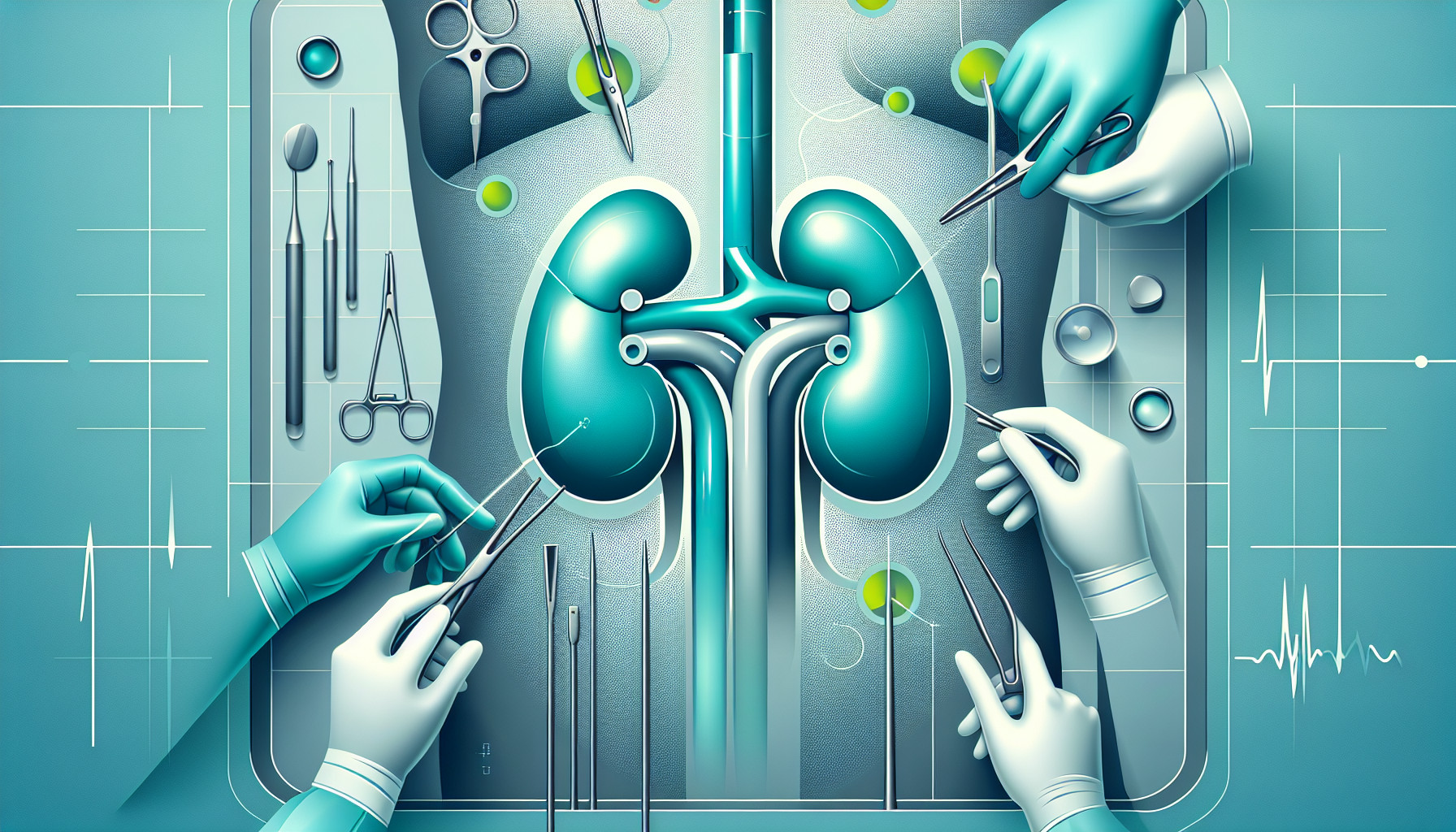Our Summary
This research paper talks about the transplantation of kidneys in patients who have a certain type of blood disorder, called plasma cell dyscrasias (PCDs), which can cause kidney disease. In the past, doctors have been hesitant to perform kidney transplants in people with this condition because there was a high chance of the disorder returning and causing death. However, new treatments for PCDs have made it possible to control the blood disorder better, leading to the need for strategies on how to best perform kidney transplants in these individuals.
Researchers from a single health center shared their methods for transplanting kidneys in individuals with PCD-related kidney disease. They also discussed the outcomes in 12 patients who received a kidney transplant. They followed these patients for an average of 44 months after the transplant. A year after receiving the new kidney, all patients’ transplanted kidneys were still working. Five years after the transplant, 9 out of the 12 patients were alive and their new kidneys were still functioning.
However, five patients experienced a return of their blood disorder. Of these, three responded well to further treatments. Four patients developed a new form of cancer, including three who developed urinary tract cancers.
The study concludes that kidney transplants can have positive outcomes in patients with kidney disease caused by PCD. The researchers suggest that a team of kidney and cancer specialists should work together to choose the right patients for kidney transplants. They also recommend that patients should be checked for urinary tract cancers before and after the kidney transplant.
FAQs
- What is the concern with performing kidney transplantation in individuals with plasma cell dyscrasias (PCDs)?
- What were the outcomes of the kidney transplant recipients with ESKD attributed to PCD in the case series?
- Why should providers consider screening for urologic malignancies pre- and post-transplantation in patients with PCD?
Doctor’s Tip
One helpful tip a doctor might tell a patient about kidney transplant is to work closely with a multidisciplinary team of transplant nephrologists and oncologists to ensure appropriate candidate selection and monitoring for potential complications, such as recurrence of plasma cell dyscrasias or development of secondary malignancies. It is important to undergo regular screenings for urologic malignancies both before and after transplantation to detect any issues early on. By following these recommendations, patients can maximize their chances of a successful kidney transplant and long-term health outcomes.
Suitable For
Patients who are typically recommended for kidney transplant are those with end-stage kidney disease (ESKD) attributed to plasma cell dyscrasias (PCDs). These patients may have had difficulty finding a suitable match due to concerns about high rates of PCD recurrence and PCD-related mortality. However, with the advancement of novel therapies for PCDs, kidney transplantation can be a viable option for these individuals. It is important for transplant centers to have a multidisciplinary team of transplant nephrologists and oncologists to evaluate and select appropriate candidates for kidney transplantation in patients with PCD-mediated kidney disease. Screening for urologic malignancies pre- and post-transplantation is also recommended. Overall, patients with kidney disease attributed to PCD have shown favorable outcomes with kidney transplantation, with most patients having a functioning allograft years after the transplant.
Timeline
- Before kidney transplant:
- Patient is diagnosed with end-stage kidney disease (ESKD) attributed to plasma cell dyscrasias (PCDs).
- Patient undergoes evaluation by a multidisciplinary team of transplant nephrologists and oncologists to determine eligibility for kidney transplantation.
- Patient may undergo treatment for PCDs to optimize hematologic outcomes before transplantation.
- Patient is placed on the transplant waiting list and undergoes pre-transplant testing and evaluation.
- A suitable kidney donor is identified and the transplant surgery is scheduled.
- After kidney transplant:
- Patient undergoes kidney transplant surgery.
- Patient is closely monitored for signs of rejection and complications post-transplant.
- Patient receives immunosuppressive medications to prevent rejection of the transplanted kidney.
- Patient undergoes regular follow-up appointments and testing to monitor kidney function and overall health.
- Patient may experience relapse of PCD or develop secondary malignancies post-transplant.
- Patient continues to receive ongoing care from a multidisciplinary team of healthcare providers to manage any complications and ensure successful outcomes.
What to Ask Your Doctor
What is my prognosis for kidney transplantation as a patient with plasma cell dyscrasias (PCD)?
What is the likelihood of PCD recurrence after kidney transplantation?
How will my PCD be managed post-transplantation?
What screening tests will be done for urologic malignancies before and after transplantation?
What are the potential risks and complications associated with kidney transplantation in individuals with PCD?
How will my immunosuppressive medication regimen be tailored to account for my PCD?
How will my care be coordinated between my transplant nephrologist and oncologist?
What is the long-term outlook for my kidney allograft survival and overall health after transplantation?
Are there any specific lifestyle changes or precautions I should take as a kidney transplant recipient with PCD?
Are there any clinical trials or research studies that I may be eligible for as a patient with PCD undergoing kidney transplantation?
Reference
Authors: Dinh AR, Wong SW, Martin TG, Wolf JL, Webber AB. Journal: Clin Transplant. 2022 Mar;36(3):e14541. doi: 10.1111/ctr.14541. Epub 2021 Nov 30. PMID: 34797567
